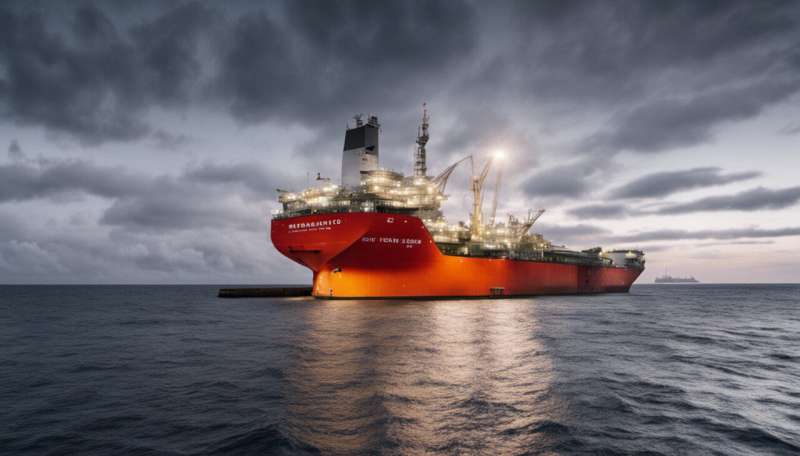Rosebank shows the UK's offshore oil regulator no longer serves the public good, say researchers

In a announcing the approval of the new Rosebank oil field 80 miles west of Shetland, the UK's offshore oil and gas regulator showed its mission no longer serves the public good.
The announcement by the North Sea Transition Authority (NSTA), which regulates oil and gas extraction in the waters off the British coast, asserted that net zero considerations had been taken into account—a technical definition that makes it appear long-term oil production is compatible with climate goals. This has outraged and dismayed climate scientists, campaigners, and the many other people concerned about the UK's faltering climate leadership.
The approval greenlights a process that is expected to produce first oil by 2026, and around 300 million barrels of oil (and a smaller amount of gas) over the next two decades. The project's developers are Equinor, an oil company owned for the most part by the Norwegian state, and Ithaca Energy, owned by the Delek Group listed on the Tel Aviv stock exchange.
The decision is out of step with demands for rapid action on climate change coming from a range of quarters. This includes shareholder activists demanding corporations accelerate decarbonization, direct action groups such as , and financiers concerned about the risks of "asset stranding" as renewables become cheaper than fossil fuels.
Public protests and to the NSTA spotlight the irrationality and recklessness in the government's expressed support for . Activists are not alone in making this point.
A welter of scientific studies and reports by confirm that new fossil fuel extraction is incompatible with keeping global temperature increases well below 2°C.
Rosebank has been a major focus for climate activism in the past couple of years, as , international policy and campaigners turn their attention to stopping new extraction, rather than solely focusing on reducing emissions. Calls to end new licensing for oil and gas are in line with climate science.
But a climate politics focused on new licensing alone misses the point. The thing is, like other North Sea oil fields yet to be approved, Rosebank was licensed for oil and gas extraction .
The NSTA approval process follows licensing, sometimes after considerable time has passed. And it is this approval process that locks the UK into hydrocarbon production for years to come.
End 'maximizing economic recovery'
The core objective of the NSTA is to maximize the economic recovery of UK petroleum—a principle shorthanded as MER—as set out in the 1998 . In practice, this means the regulator's primary mission is to facilitate the extraction of oil and gas.
A revised strategy in 2021 paired MER with an . And the former Oil and Gas Authority to include an explicit reference to the "transition" in 2022, underpinned by ambitions for emissions reduction and decarbonization.
NSTA sees its job as effecting the industry's alignment with these goals. It is of licensing for carbon capture and storage and offshore hydrogen storage.
Rosebank's approval therefore reveals a deeper truth: the regulator's guiding objective fails the public good test. Regulation aims to avoid economic, environmental and social harms, and ensure the through delivering collective benefits and upholding socially-desirable ideals. The Rosebank decision arguably breaches this principle.
Supporters of Rosebank argue it will contribute to the UK's energy security and deploy decarbonization technologies that . These arguments do not stand scrutiny, however: oil from Rosebank, , will be sold directly into international markets and will not materially affect the price of petrol or diesel for UK motorists.
Much of the value of that oil will flow into the portfolios of Equinor and Ithaca. That value could be harnessed to speed up transition to renewables or ensure its benefits are widely distributed, but that's largely down to Equinor and Ithaca—not the UK government.
The NSTA asserts that its decision has "", yet the sector's own decarbonization ambitions count only those emissions associated with , and exclude those from burning it ().
Rewrite the Petroleum Act
A decade ago, a decision by NSTA would not have raised much attention. Now it highlights a significant problem in need of reform. Piecemeal adaptation has left MER and other core regulatory principles untouched, which is at odds with the climate emergency.
Existing licensed fields escape the weak scrutiny embodied in instruments such as the , a series of tests to be applied in decisions about future licensing rounds. What's more, as a for approval, Rosebank indicates other licensed projects may get the go-ahead, like Cambo.
Removing NSTA's central objective to maximize economic recovery requires nothing less than a rewrite of the Petroleum Act. This would be an opportunity to fundamentally revise what the North Sea is for, and whether or how to exploit its resources in the future. A start would be to consider a reversal of direction—a "minimizing" of economic recovery, for example—which redefines the "economic" in terms of what is socially necessary.
Such a move will inevitably entail reviewing licenses already in place, and will likely generate challenges from the sector and other powerful incumbents. Rosebank exposes, however, how the new mission of the offshore regulator has to be about securing a new public good. This needs wider social debate, and should ultimately be decided through parliament.
Provided by The Conversation
This article is republished from under a Creative Commons license. Read the .![]()



















